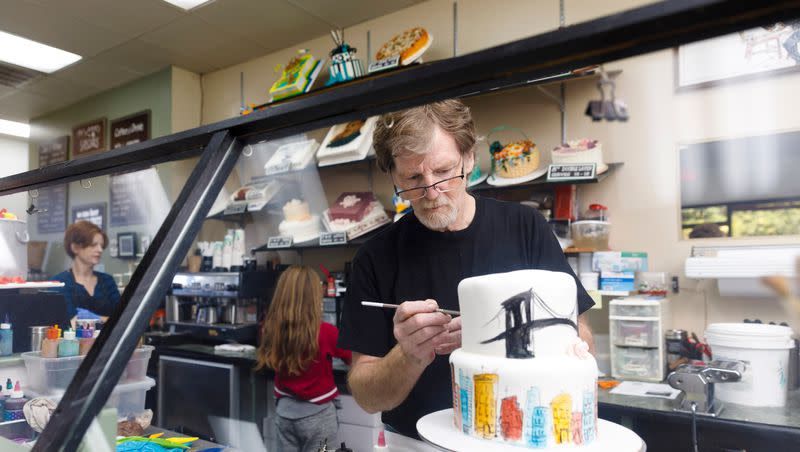Perspective: Religious intolerance is taking new forms

As religion becomes less prevalent in American society, public expression of intolerance toward religious belief naturally increases. Those who read the comments in major news publications are familiar with the “keep your sky god’s beliefs to yourself” and “religion is the source of all evil” tropes in active play there.
The acceptable limits of religious belief are constantly tested in lawsuits, with the most well-known example being the legal saga of the owner of Masterpiece Cakeshop, Jack Phillips. Some members of Congress have been searching for ways to shore up rights to religious belief, with a number of bills having been proposed, but not yet signed into law.
As a political scientist and a believer, I monitor this frontier of controversy with great interest. Two recent news stories suggest that intolerance of religious belief is taking new forms.
The first story is from DePaul University, the largest Catholic university in the U.S., founded in 1898 and now serving more than 20,000 students in the Chicago area. DePaul’s mission statement says, “Among the largest Catholic universities in the United States and the world, our mission proceeds from the heart of the Church and remains grounded in the values and life example of Jesus of Nazareth.”
Of course, DePaul admits students and hires faculty and staff from many religious traditions, and it aspires to respect the beliefs of all of those traditions. “We are home to dozens of student religious organizations (Christian, Jewish, Muslim, Interfaith and more) and provide community building, worship, pastoral care, and study opportunities online and on (campus),” the university’s website says.
It’s interesting, then, to note the recent back-and-forth between DePaul students and administration over a Christian student group calling itself “Vessel” that stated it did “not affirm the LGBTQ lifestyle.” Other DePaul students began a petition to have the group banned from campus for being discriminatory, even though Pope Francis has called homosexual acts a sin (while saying that laws against homosexuality are unjust).
To its credit, the DePaul administration explained to the offended students that, given it is a Catholic institution, there is no policy against being non-affirming of the LGBTQ lifestyle, and in any case the student group was not registered with DePaul and not meeting at DePaul.
The response by the students?
“(Vessel’s) non-affirming beliefs and clear display of homophobia are allowed here at DePaul. In fact, as one of the deans made us aware, there are plenty of groups on campus who are (and are allowed to be) non-affirming. Expressing a belief that an entire group of individuals is inherently ‘sinful’ in their lifestyle (although being LGBTQIA+ is not a choice and not a lifestyle) doesn’t violate anything here at DePaul. Isn’t that crazy?!”
That last line is what is so interesting to me — the students thought it was crazy that Catholic doctrine was believed and publicly affirmed at a private Catholic university. They fully believed that DePaul would back them up and were gobsmacked when it did not. That says something to me about how abnormalized traditional religious doctrine has become in the United States. What I wonder, sincerely, is if the DePaul administration will take the same position in 10 years, or if the intolerance of religious beliefs will have grown so intense by then that this would be impossible.
Related
The second story comes from Vermont, where the basketball team at a private Christian girls’ school declined to play against a team with a transgender student on it. The head of Mid Vermont Christian School, in explaining the decision not to play, said, “Playing against an opponent with a biological male jeopardizes the fairness of the game and the safety of our players.” I think the science is on their side here, and it is also true that 18 states support that position. Even certain sports federations, such as one for rugby, support that position.
In the past, one would imagine that forfeiting a game would be punishment enough for holding to one’s religious beliefs about the immutability of sex. But in a new twist, the Vermont Principals’ Association has upped the ante sky high. Not only will the girls’ basketball team of this small school be banned from playing in Vermont school sporting events entirely, but it’s been reported that the school will be banned from all inter-school competition, including science fairs and spelling bees, under the umbrella of the association. The school, in effect, will be completely cancelled in the state.
This authoritarian overkill, too, is a new development. Interestingly, this case, and also the DePaul case, demonstrate quite clearly the results of a new empirical study in psychology.
The study, based on survey data from 60,000 individuals worldwide, gave evidence of the growth of authoritarianism on both sides of the political spectrum. According to the lead author, “In my field, the idea that there is really a ‘left-wing authoritarian’ problem has been called a ‘myth’ on par with the Loch Ness Monster. But our recent paper leaves no doubt: Left-wing authoritarianism is no myth, but a real and pervasive issue. When people (including some scientists) say authoritarianism is mostly a right-wing problem, they are simply wrong. They aren’t saying that because it is scientific; they are saying that because of wishful thinking.”
What happened at DePaul, and what is happening right now in Vermont, are bellwethers of this new authoritarian turn. We are currently bookended by authoritarianism in the United States, on the right and on the left. Now is the time to ask ourselves whether we are willing to push back against all authoritarianism, no matter its source.
Valerie M. Hudson is a university distinguished professor at the Bush School of Government and Public Service at Texas A&M University and a Deseret News contributor. Her views are her own.

